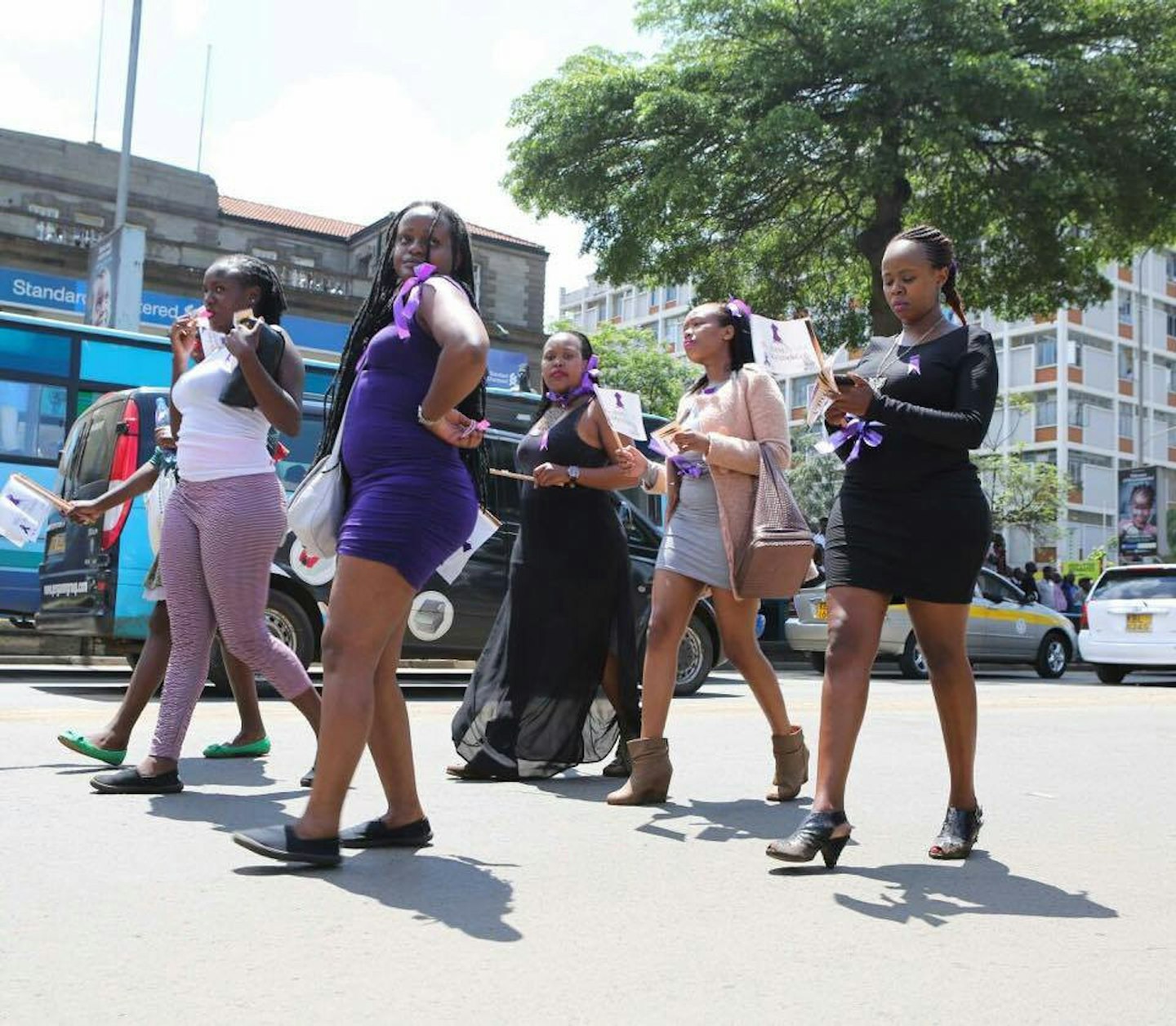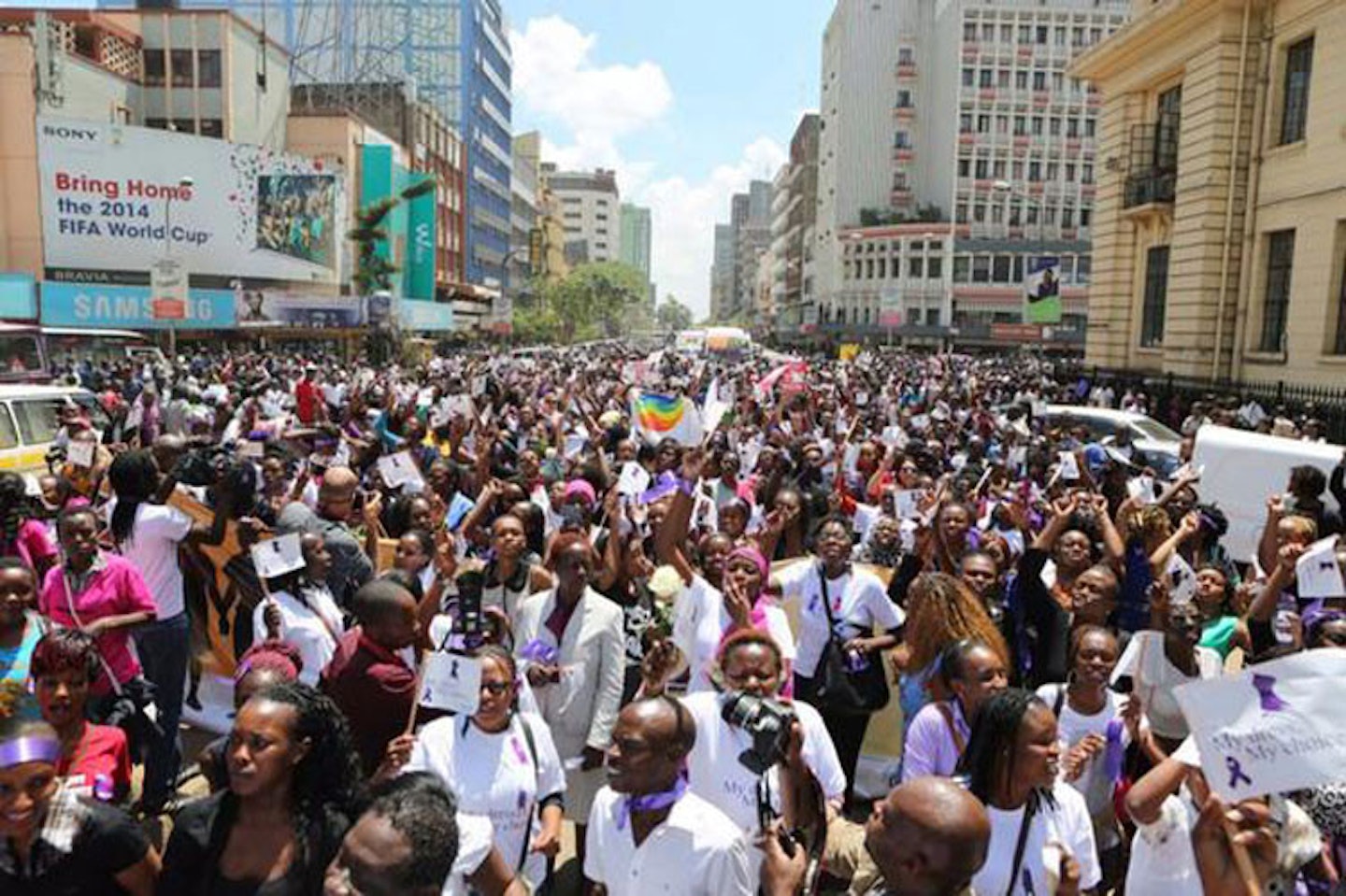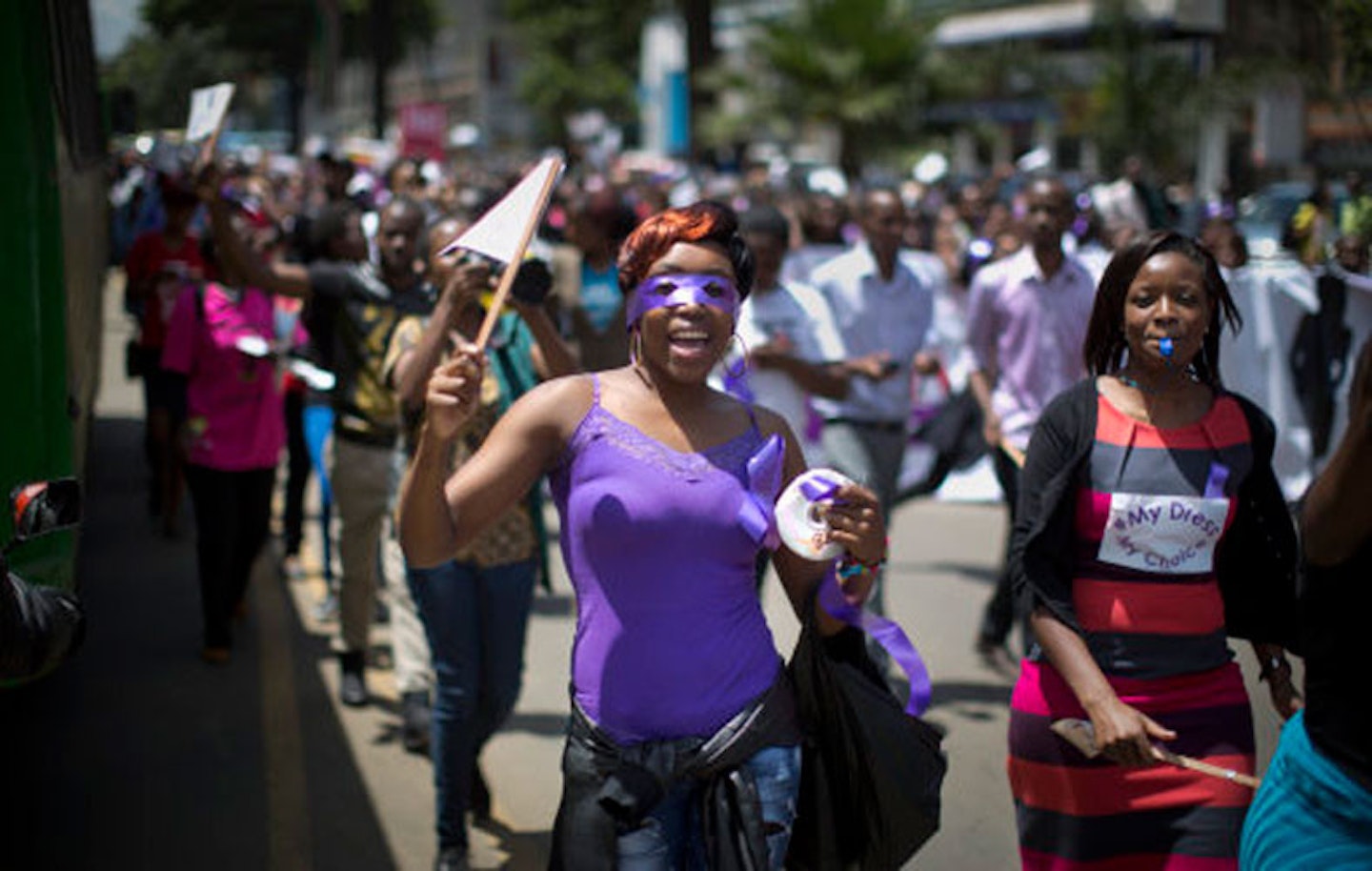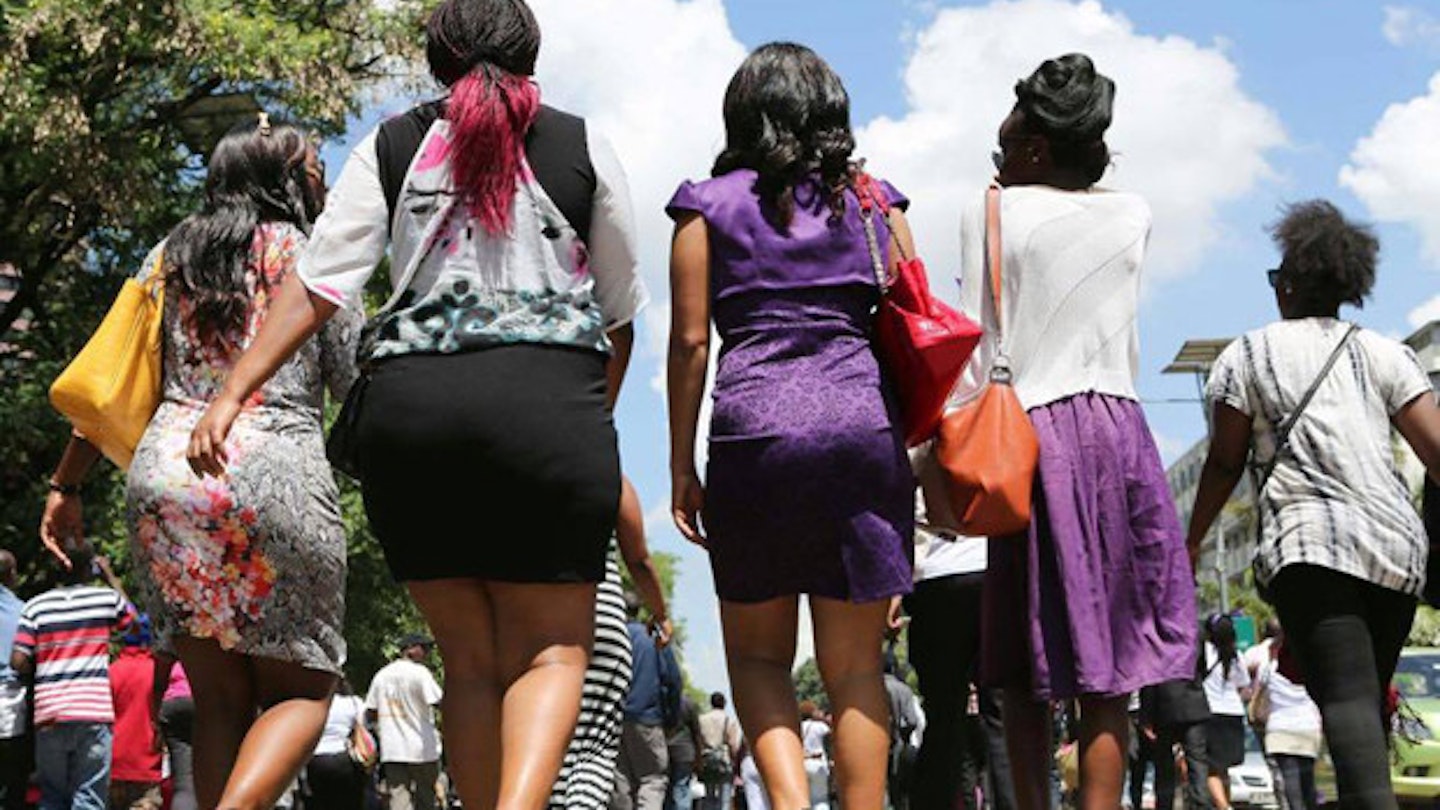One balmy evening during rush hour, an unknown woman is waiting for her ride home at a crowded bus stop. Wearing a black miniskirt and a red top – attire pretty appropriate for weather of 23 degrees and a long non-air-conditioned journey – she’s soon set upon by a group of men, who yell ‘Jezebel!’ at her, and push her about, tearing at her clothes until they come off. They kick her in the groin and beat her. Her crime? Wearing a short skirt. Of the dozens of men assaulting her because she was, in their eyes, ‘indecently dressed’ and ‘tempting’ them, one puts his hand up. Armed with a cameraphone, he films the whole incident and uploads it to YouTube.

The video, filmed in the central business district in Nairobi, Kenya, went viral earlier this week. And something’s being done about it, largely thanks to the
to the President Uhuru Kenyatta, saying, ‘I was traumatized and angry at how the crowd manhandled and groped the young lady, how they continually humiliated her and tried to parade her nakedness, how they jeered and cheered as they stripped her of all her dignity.’ Perhaps unsurprisingly, the post was then shared over 1,000 times.
READ MORE: Canadian Girl Takes Stand Against School's 'Humiliating' Dress Code
But despite the groundswell of support online, there hadn’t been much response from the police since the video first went live last week. Though sexual harassment and assault laws exist in Kenya, a case cannot be pursued without the victim’s statement, and victims of sexual assault are often too ashamed to come forward. Only one in 20 rapes are reported.
That’s perhaps why the identity of the woman in the video – and what happened to her after she was stripped naked – still isn’t known. It’s also why Kilimani Mums decided to mobilise on the woman’s behalf.
They started the #MyDressMyChoice hashtag online and held a physical protest in the centre of Nairobi, too. Over 1,000 protestors, some male, most female, took to the streets chanting, blowing whistles and handing out flowers at bus stops like the one where the woman was attacked. They wore whatever they wanted. Miniskirts, the movement’s official purple T-shirt, a purple balaclava, dresses for the men, a burqa.

Their banners read ‘Say NO to violence against women’, ‘Don’t sexualize MY body’, ‘My body, my money, my closet, my rules’ and the UN’s sadly universal statement ‘1 out of 3 women will be raped or assaulted in her lifetime’. Online, the women who couldn't get to the protest took part in the #MyDressMyChoice challenge, uploading photos of themselves from places as disparate as Newcastle and Dallas, or changed their profile photo to a purple ribbon.
On paper, Kenya looks like it’s a place of much stability and a fair whack of gender equality; on the recent World Economic Forum Gender Equality report, it was only 11 places behind the UK, ranking 37 out of 142 countries. After disruption following the 2007 elections, it’s economically stable and politically peaceful. But with relative prosperity, tension has emerged about the rising status of women.

‘Women are becoming more independent, influenced more and more by western cultures,’ Naomi Mwaura, 28, one of the Kenyans behind the protest tells The Debrief. ‘This changes the style of clothes they wear and I guess the men of our society are just reluctant to accept these changes. No woman is safe until we are all safe.’
READ MORE: Egyptian Woman Stagets Most Provocative Anti-Isis Protest We've Seen
The first report of ‘stripping’ in Kenya was in Nyeri in May 2013. Local ‘touts’ – people who work on the transport system – were trained to treat women with ‘dignity’, but there were no arrests. Since then, the FloNe Initiative, a programme that runs projects to promote gender equality in Kenya, has reported a dramatic increase in women being publically attacked for what they wear.
‘There is no official ethical code of dressing in Kenya,’ Naomi, who founded FloNe. continues. ‘The victims have been wearing different outfits. In Mombasa, blue jeans. In Nyeri, a dress. In Kisumu, white trousers. Despite what a woman is wearing, she can still fall victim. It’s not about indecency anymore, but the people doing this are enjoying it.’
This chauvanistic culture has likley spread from similar attitudes in Kenya’s neighbouring Uganda – which used the introduction of an anti-pornography law to ban the miniskirt in February 2013. Soon after, ‘stripping’ was reported, and protests against it ensued. The miniskirt ban has been U-turned by its proposer, but some men are still using clothing as an excuse to strip women in the street with no fear of retribution. Kenyan men's rights activist Ndiritu Njoka, who is currently calling on men to boycott sex with women to protest against domestic violence against men, displays how these ideas are seeping into Kenya. Ndiritu has responded to the viral video by calling for the miniskirt to be banned.
But while the #MyDressMyChoice campaign has focused on the idea that a woman’s safety on the street should have nothing to do with what she’s wearing, the incident has a wider resonance – a lack of impetus amongst the police to follow up sexual harassment claims.

READ MORE: Awesome French Boys Wore Skirts To School To Fight Sexism
Nairobian Diana Rose, 31, tells The Debrief she helped organise protest because she was frustrated. ‘The police have failed us big time, there is a video but no-one has been arrested. They lack the expertise and it makes a huge loophole in our system. Criminals are just walking away. I don’t feel safe in Kenya, the amount of intolerance is scary and disturbing.’
Over 3,000 people have now signed a FloNe-led petition demanding tougher action on the abuse of women and following Vice President William Ruto's pledge to bring the perpetrators to justice, the police have now arrested 100 men in a series of mass arrests. However, according to the BBC’s reporter, this could be a foil. ‘Mass arrests are often carried out by police in Kenya when they are under public pressure. It leads to the arrest of many innocent people who are later released.’
Meanwhile, Diana and her fellow protestors have a long checklist for the powers that be. ‘We want perpetrators arrested. We need a well-trained police force to handle these matters. We need a database for sexual offenders, we need jurisdictions for stripping and other forms of assault like marital rape. We demand CCTV.’ And, of course, the right to wear a skirt any length they like.
Like this? You might also be interested in:
'I've Had Death And Rape Threats Simply For Starting The Conversation About Everyday Sexism'
Follow Sophie on Twitter @sophwilkinson
This article originally appeared on The Debrief.
